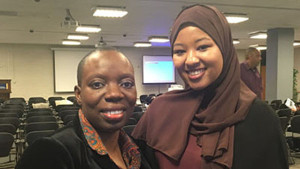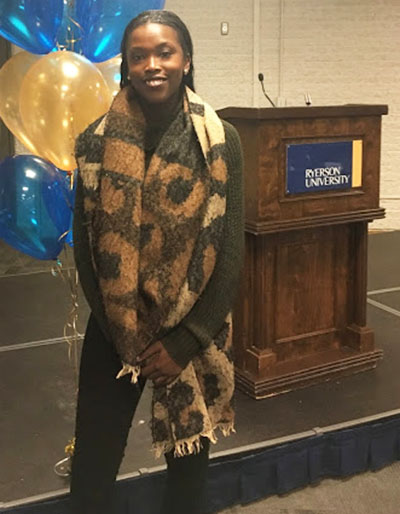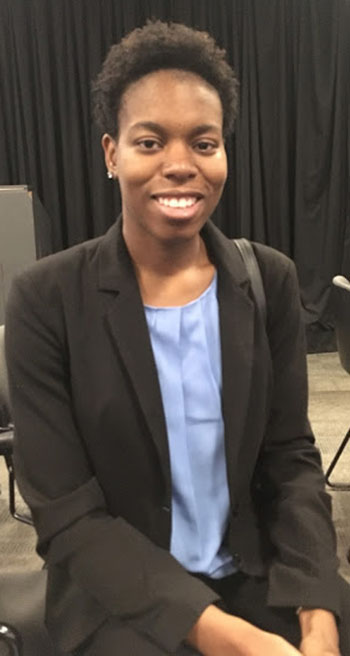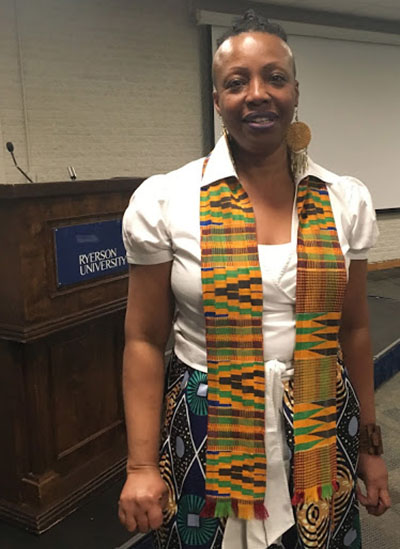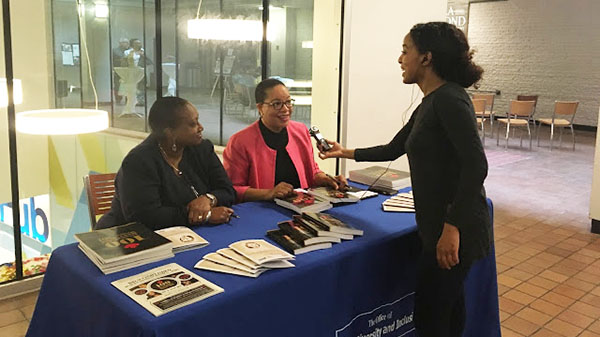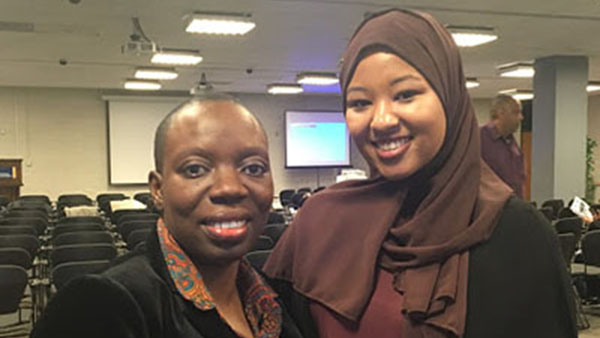
Dr. Annette Bailey, Associate Professor, Daphne Cockwell School of Nursing, Ryerson University, left, and Siifan Hassen, Grade 12 student at Central Technical School, recipients of the Senator Wanda Thomas Bernard Award and the Viola Desmond Award. Photo by Neil Armstrong.
in National News March 8, 2017 0 204 Views
By Neil Armstrong
Contributing Writer
TORONTO, Ontario March 8, 2017 — In celebration of the strength of Black women, Ryerson University presented four awards and a bursary to five women at its 9th annual Viola Desmond Day awards ceremony on March 6.
The five recipients are: Dr. Annette Bailey, associate professor, Daphne Cockwell School of Nursing; Donica Willis, a graphic and web specialist at Ryerson Student Affairs; Devenae Bryce, a student in the business technology management program at Ted Rogers School of Management; Siifan Hassen, a Grade 12 student at Central Technical School; and Sharon Folkes-Hall, a 4th year social work student.
Organized by the Ryerson Black History Awareness Committee, each year, the awards are named after Black Canadian women “who have made it easier for the Black community to grow and have success stories for us to celebrate today.”
This year, the awards were named: Senator Wanda Thomas Bernard faculty award, Rosemary Sadlier staff award, Paulette Senior Ryerson student award, and the Viola Desmond high school student award, which is the only standing award at the ceremony each year.
Donica Willis, Graphic and Web Specialist, Ryerson Student Affairs, recipient of the Rosemary Sadlier Award. Photo by Neil Armstrong.
Willis, who moved to Toronto from Halifax (Preston) in 2010 to study graphic communications management at the university and received the Rosemary Sadlier award, said it “hit a soft spot.”
She said Desmond was from where she is from in Nova Scotia and while growing up she knew about her and view her as someone who did amazing things.
Her passion for arts and creativity through design led her to a full-time position at the university upon graduation and she founded her graphic design company, DW Creativ.
Her most recent art project, the annual BLAQK GOLD, is a visual campaign that aims to celebrate extraordinary black people from around the world during February.
Devenae Bryce, Business Technology Management Program, Ted Rogers School of Management, recipient of the Paulette Senior Award. Photo by Neil Armstrong.
“I didn’t really make it to create this big income or anything. It’s really just me expressing my art through something that is near and dear to me as someone black.”
Before going to Ryerson, Bryce earned a bachelor’s degree in forensic science from Laurentian University where she also played basketball.
“I’ve always wanted to help people and I always loved science so I knew that forensic science was like a good way to balance both of those passions of mine,” says the Paulette Senior award recipient and student athlete whose five-year basketball career at Ryerson came to an end recently.
She says her love of technology and computers, a sector which changes everyday and is a very demanding, is causing her to lean towards a career in computer forensics.
Women of colour are uncommon in this demanding field but she uses this as motivation.
Bryce lived in Newmarket for 10 years where she was the only black girl in most classes and on the sports team. She then moved to Whitby, Barrie and Sudbury before coming to Toronto.
She had to teach herself about Black history in the library and would do her projects on people like Malcolm X and Rosa Parks and share them with her peers.
Being the child of a single mother who came here from Jamaica, Bryce praised her mother for being a major inspiration in her life.
Dr. Bailey, recipient of the Senator Wanda Thomas Bernard award, holds a PhD in public health science.
Her research sheds light on the immense grief and traumatic stress experienced by black mothers who lose children, and youth who lose siblings and friends to gun violence.
She works closely with community-based organizations to support families affected by community violence.
“Community organizations that are addressing the issue of gun violence are not very popular. They’re not popular, in terms of getting funding like other organizations, and so they are always needing resources, whether it be in terms of ideas to develop their programs, expertise in funding proposal development, as well as helping to run planned programs.”
The few organizations that she works with consistently are in the Jane and Finch area where “they tend to be the ones that have needs the most and they are well-situated in one of the communities that’s very much impacted by gun violence.”
She helps the Out Of Bounds grief support organization in applying for funding, to do grassroots research, promote the research and build capacities around writing and publishing the work in journals and in book chapters.
In 2015, she established a scholarship program in the Jane and Finch community to support the educational pursuits of at-risk youth.
“I did that because as we know our black men nowadays are falling rapidly to gun violence. I see that our black youth are more than just images of criminality. Black men have a place in our society and they need to be able to live long enough to be able to take their rightful place in communities, in their families, as fathers, and mentors and advocates. Unfortunately, they’re not getting that opportunity and we cannot just focus on the reactive effort, we have to be proactive, and proactive means that we do what we need to do to prevent violence, to prevent them from dying and education has been dear to my heart.”
Bailey grew up with her grandmother telling her that education is the key, that knowledge is power and so she took that to heart.
“Starting the scholarship program is a way to help them to even see their potential for university and so far this is the second year that its been running and we’ve been able to give out dozens of awards, particularly to black youth in the Jane and Finch area. Because of having that resource in place, they know see that it’s possible for them to get the resource to go to university.”
Professor Bailey has been advocating for resources for survivors of gun violence.
She said grief is debilitating for mothers whose children, particularly their sons, are gunned down.
“Many of them lose their jobs because they can’t cope, some lose their homes and all their financial means.”
She said what she is seeing is that 90% of black mothers in Toronto who lose their children to gun violence do not get victim compensation for various reasons, such as, “your child was known to the police and because you’re not demonstrating what they call mental shock in order to show that you are severely mentally affected by the issue and seeking psychological resources. Many of these mothers don’t have the energy to even seek it and they don’t have the monies to be able to afford it.”
Bailey said what she is hearing as she interviews youth is that they are not getting the supports in place as well.
“One youth can lose up to 30 friends in gun violence. Imagine the trauma of that on a youth, their psyche. Some of them end up dropping out of school, some retaliate the death of their friends and their siblings. There are no mental health, community-based mental health or any other system-based mental health resources for these youth. So what we’re seeing is massive mental health problems that is misunderstood and misinterpreted for some other issue, for rebellion among the youth. But many of them are suffering from mental health problem and mothers are also suffering, and it’s important that we are able to understand their plight. The families are impacted, the communities are impacted, and the reason that many of these mothers are breaking down, some are developing even high blood pressure and other physiological diseases is because they don’t have the social and the system support and the financial support to help them.”
Hassen, recipient of the Viola Desmond award, tutors her peers and younger students in one of her favourite subjects, chemistry.
As a self-supporting student, she manages to work part-time and maintain an average between 80 and 90%.
She is very passionate about inequality and injustices around the world and enjoys giving back to the community.
“I think it’s very important because a lot of people don’t have access to what some people take for granted and I think that’s really important for people to understand and recognize. I attribute it really to my parents, what they’ve shown me of the world, like my mom, she always tells me you’re a woman, you’re black and you’re Muslim, you’re ultimate minority. You’re going to have to work three times as hard so I want to help as many people so they don’t necessarily have to work as hard so that they have chances that they might not have gotten otherwise.”
Hassen wants to become a successful businesswoman and be able to employ as many people as possible.
Sharon Folkes-Hall, 4th year Social Work student, recipient of the Viola Desmond Bursary. Photo by Neil Armstrong.
“Hopefully that spans across multiple borders because my goal is to not only open a business but a business in a developing nation where I can help them start up and give them jobs and opportunities so it helps them and helps their kids.”
Hassen says Viola Desmond is one of her icons because she was not only a successful businesswoman – which she hopes to be – but she was also an activist and led the way against segregation.
Folkes-Hall received the Viola Desmond bursary. She acknowledges the intersectionality of oppression and discrimination which informs her commitment to social justice, equality and freedom for all people.
She said she feels like Desmond is one of her aunts as the “culture calls for many aunties and uncles, adopted brothers, sisters, their relatives.”
“I feel like I would be saying Aunty Viola, you go, you did it, you rock, in my language, Jamaican language we say she’s good as gold and she is.”
Her ancestry is made up of communal, African and Jamaican traditions and customs centred on unity and togetherness.
It is from this ancestry and upbringing that she has learned the value of caring, and showing respect for one’s elders, as well as all diverse groups.
The social work student has a wide range of community-based volunteer experience with many organizations, including the 519 Community Centre, Women’s Health in Women’s Hands, Marcus Garvey Youth Club, Jamaica Daughters of Domestic Help, among others.
She said Daughters of Domestic Help was organized to recognize that these Jamaican women came here with professions, to acknowledge the work they did and to reflect on what they “had to give up to come here. A lot of times that is not spoken in our Canadian society, but they had to give up their family. It’s a part of displacement as well because they couldn’t come in saying that ‘I’m a mother and I have a family.’ They had to be single women coming in and how they were treated.”
Folkes-Hall said social justice is in her DNA and she wants equality achieved before she dies.
“What equality mean to me is when I enter into a place I don’t have to put up with any racist subtle practices, or belief or hindrance and it pains me as well because young people are going through it.”
She says there is a ‘sistering,’ a movement of Black, Caribbean and African descent women where she goes to unpack all the systemic racism and structural barriers and there are young people who are saying this is how we feel, this is what’s going on.
Dr. Denise O’Neil Green, assistant vice president/vice provost equity, diversity and inclusion, said it was wonderful to know that as a community Ryerson University is the only one in Canada that has an annual celebration in the memory of Viola Desmond.
Dauna Jones-Simmonds, left, and Dr. Denise O’Neil Green, co-authors of the book, “100 Accomplished Black Canadian Women,” being interviewed. Jean Augustine is also a co-author of the book. Photo by Neil Armstrong.
“And we’re also one of the few institutions in the country to offer an annual Viola Desmond bursary,” she said, noting that in the States where she is from many universities across the country celebrate Dr. Martin Luther King Jr. day, week or month.
“Wouldn’t it be something if Viola Desmond and her legacy was celebrated every year to remind us of where we’ve been, where we are now and where we need to go?”
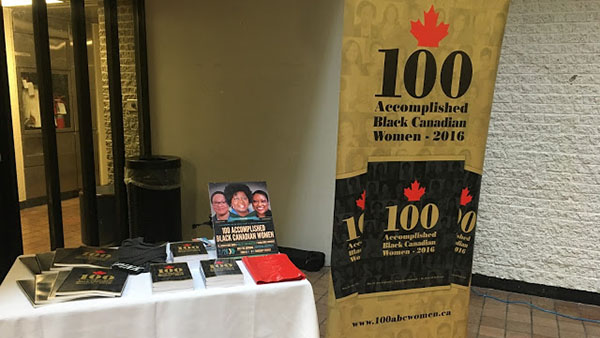 Darrell Bowden, manager of EDI – education and awareness for the Office of Equity, Diversity and Inclusion (EDI) said the idea for the Viola Desmond Day awards started when a male social worker entered his office one day and told him that he had heard about Desmond and wanted to know what Ryerson could do to celebrate her.
Darrell Bowden, manager of EDI – education and awareness for the Office of Equity, Diversity and Inclusion (EDI) said the idea for the Viola Desmond Day awards started when a male social worker entered his office one day and told him that he had heard about Desmond and wanted to know what Ryerson could do to celebrate her.
Bowden, who is from New Glasgow, Nova Scotia, listened and it was from that idea “that we started talking about how do we celebrate, how do we create a story and create a synergy that allows us to celebrate the history of this individual while at he same time helping to build an educational program that allows folks to learn more about other black women of Canadian history who we don’t know. Thus was born the Viola Desmond Day ceremony.”
The awards are based on a nomination process involving members of the university community who nominate a faculty member, a staff member and a Ryerson student. Community partners nominate the high school student.
Bowden said there was a connection of the event and the book, “100 Accomplished Black Canadian Women,” that was being signed at the reception just before the awards ceremony.
“Viola’s story needs to be written down. A lot of our black women need to have their story written down so that we have that database of information that we can now search and find out who else is notable in Canada.”
The co-authors of the book are Jean Augustine, Dauna Jones-Simmonds and Dr. O’Neil Green.
“The fact that you’re doing this it truly is a celebration of the social justice work of Viola Desmond but also all women and certainly women of African descent around this country so it’s not just here in Toronto,” said Senator Thomas Bernard.
 Desmond was an African-Nova Scotian whose story involved one of the most publicized incidents of racial discrimination in Nova Scotian and Canadian history.
Desmond was an African-Nova Scotian whose story involved one of the most publicized incidents of racial discrimination in Nova Scotian and Canadian history.
Senator Thomas Bernard said Desmond’s activism did not start that day on November 8, 1946 but went as far back as her reason for starting her own beauty school.
“Did you ever ask yourself why did she have her own beauty school? Because she couldn’t get into the beauty schools because segregation was alive and well in Nova Scotia and she not only made a change and made a difference for herself but she created those opportunities for any African-Nova Scotian woman who wanted. And she was traveling because she wanted to take products that she was creating.”
The senator said the enormity of that inspires her to a level that she can’t even speak to.
Senator Thomas Bernard said segregation is alive and well in Nova Scotia, it’s just not legally segregated.
“And so we need people to stand up. Viola Desmond sat down so that she could stand up for her rights and we all need to be standing up for our rights and the rights of everybody every single day. So that when we see things that are out of step, we need to say something about it and we have to find the courage deep within our souls to do that. That’s what Viola Desmond did, that’s why she was able to take a stand in that theatre because she knew, she had the conviction of a person who knew that if she continued to allow her rights to be eroded, the rights of other people were being eroded as well.”
Rosemary Sadlier, former president of the Ontario Black History Society, said she met the late Carrie Best when she was working on her first book because there was not a lot of African Canadian material.
“In meeting Carrie Best, I was apprised of the situation of Viola Desmond and yes, absolutely, I credit and support and thank Viola Desmond’s sister, Wanda, for helping to share her story over time and advocating for that but I did too and many of you may well have as well. I did by virtue of going into schools, seeing that they would talk about Rosa Parks who I also met, wonderful beautiful woman but in praising and hold up and affirming this African American we were somehow managing not to recognize the amazing people that had done and contributed, sacrificed, suffered to make a difference for all of us.”
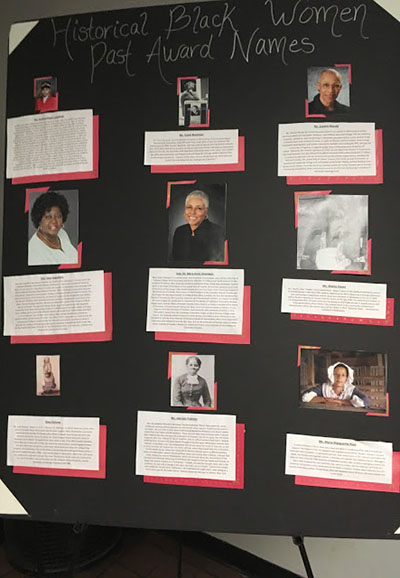 Sadlier said while Rosa Parks was selected, vetted, trained and had a cadre of legal and community activists ready to assist her at every turn and “was the chosen test case,” Viola Desmond was not.
Sadlier said while Rosa Parks was selected, vetted, trained and had a cadre of legal and community activists ready to assist her at every turn and “was the chosen test case,” Viola Desmond was not.
“Viola Desmond went out there and did her own thing to the best of her ability and yet this person who didn’t have a plan ended up becoming this person who is going to be someone you will never forget.”
Senior, president and CEO of the Canadian Women’s Foundation, Canada’s public foundation for women and girls, said it was important that Ryerson had chosen the time between Black History Month and International Women’s Day “to combine this incredible important event to celebrate women but not just women, black women, African Canadian women in the glory of who we are.”
She said she was proud to be a part of this community of women and look forward to the leadership of those women who received awards because they are now being handed a baton “for which you now will become responsible for passing on to others.”
Viola Desmond will be featured on the $10 bill which will be unveiled in 2018.
The Ryerson Black History Awareness Committee is already planning its 10th Viola Desmond Awards for 2018.
This year, it will be launching a fundraising campaign aimed at establishing an endowment fund for the Viola Desmond program and bursary.
In 2018, there will be a two-day symposium that will examine “Black Women in Leadership.”
The emcees for Monday’s event were Kia Cummings and Priscila da Silva with entertainment provided by the Sam Heineman Quartet Kwebena Yafue African Drums Circle, and Knikole, Denese and Renee Whittaker.
Courtesy of Neil Armstrong’s blog, Angles Covered: anglescovered.blogspot.com.
Source: Pride

